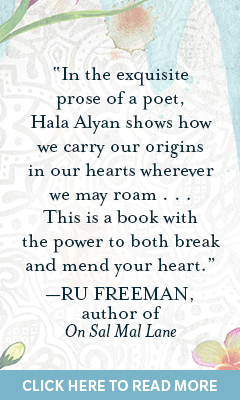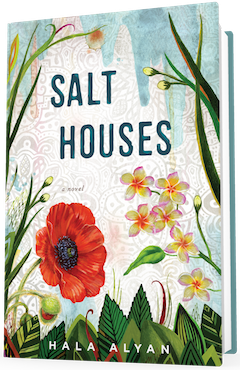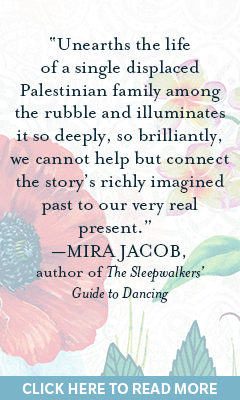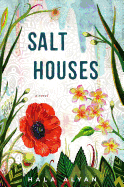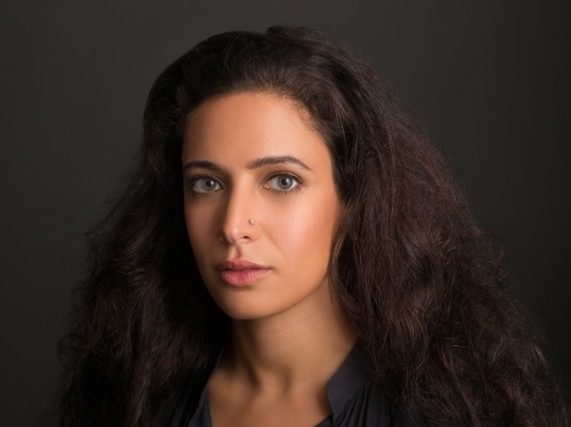Salt Houses
by Hala Alyan
Salt Houses is about the in-between--a series of snapshots amid wars and eras of socio-political unrest, and the in-between moments that make up so much of regular life.
Hala Alyan's first novel follows the lives of one Palestinian family through the last half of the 20th century into the 21st. Although the history of the Middle East is filled with fraught moments during this time, Salt Houses focuses on what happens before, and after, those moments. Alyan, a poet who also works as a psychologist, is more interested in how people choose to, or choose not to, move on from moments of trauma and upheaval.
The book begins in 1963, with the wedding of headstrong Alia and taciturn Atef, a simple middle-class marriage in the Palestinian town of Nablus, and a reading of Alia's future by her mother, Salma. The fortune telling is left abstract and promptly forgotten as a plot point, but that forgetting serves an important purpose. A lesser book would tie itself to that fortune, returning to it over and over again as the narrative moves forward. But in Salt Houses it is what comes after the fortune telling that's important. Salma reads her daughter's tea leaves, and, in an act of motherly protection, lies about what she has seen. Alia most likely never thinks of her fortune again, but Salma's act of withholding knowledge from her daughter reverberates throughout Alia's life, as she chooses what to reveal to her own daughters--Riham and Souad--and those daughters in turn face similar choices.
Salma's silence, while noble, does little to actually protect Alia from the traumas to come. Soon, she and Atef must flee Palestine for Kuwait, raising their family in a foreign world that shatters once the Gulf War begins. Their three children flee in turn--one, Riham, into a marriage to a much older man and a life of faith, the other two, daughter Souad and son Karam, to the West.
Both Souad and Riham define themselves with respect to Alia, and their lives are in a certain sense a rejection of her semi-Westernized life of little faith and transient culture. The daughters ultimately move to opposite ends of Alia's position on faith and family, with Riham diving into Islamic practice that was marginally touched on during her childhood and Souad nearly abandoning Palestinian culture altogether for cities like Paris and Boston. Atef, unable or unwilling to step in to help his wife's worsening relationships with her children, watches from afar, still wrestling with his own guilt from having survived the Six-Day War of 1967.
Like Salma, Atef and Alia keep things from their children, attempting to protect them and themselves. But they have been refugees many times over, and that trauma isn't so easily hidden. Their children inherit it, grow up with it, and it informs their choices as they become another generation of the Palestinian diaspora.
The idea of hiding, or withholding, is built into the structure of the book as well. Although the narrative runs through multiple wars, it mostly skips past them, keeping itself firmly in the everyday for these characters--birthday parties, reunions, games among the children. One exception is a chapter set during Iraq's invasion of Kuwait, but even that is told from afar, the narration focusing on Souad as she watches news of the war from a bar in Paris. The Israeli-Palestinian conflict, the Gulf War, the Lebanese civil war and the terrorist attacks in America on September 11 all play pivotal roles in the lives of Alia and her family: forcing them to relocate, to rethink their own identity, to reach out to their siblings and children. But they all do so as echoes. Alyan shuns scenes of wartime, and instead depicts the emotional aftermath of violence and destruction, when people must assess their lives and continue to move forward.
The larger global conflicts lurk in the background, coloring remarks by the characters and their choices, but Salt Houses is interested in how a family can grow and survive in the wake of those conflicts. By following a family through multiple generations, Alyan shows how decisions about survival turn out in the long run. But there are no clear answers. Are the fights between Souad and her daughter Manar simply the struggles of adolescence, or are they a continuation of Souad's fights with Alia, and Alia's with Salma? Each daughter is in turn faced with a war, and her own new status as a refugee or immigrant (sometimes within the Arab world, sometimes beyond). Does she act with her mother's choices in mind, or do those choices linger somewhere in her unconscious? Ultimately, the answer to these questions might be neither, or both.
Merely by being a novel about Palestinians, Salt Houses will be considered a political work. That's unfair, given that Alyan very purposefully eschews any political position (in fact, the book seems to suggest any political stance is ultimately rendered untenable by the flow of time). The history of the Palestinian people drives the narrative, but Salt Houses treats it as ancillary, a way to present decisions that it can be probed to explore deeper questions about family, love, and overcoming trauma. Those looking for a simple book about the conflicts in the Middle East will be disappointed. But Salt Houses isn't written for that kind of reader. It's for those who understand the importance of family and culture, and how easily both can be riven. --Noah Cruickshank



